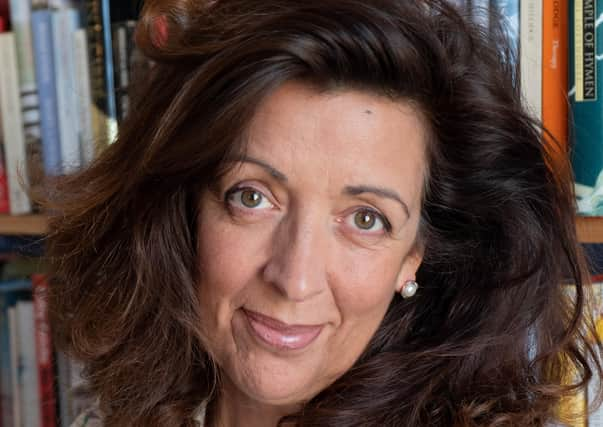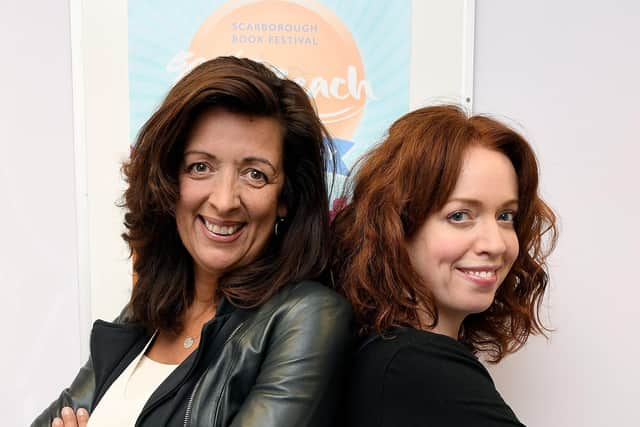How student rail journeys from Leeds inspired Louise Doughty’s ghostly thriller


In January 2017 a dark, twisting psychological thriller hit our TV screens and instantly became a national talking point. Apple Tree Yard, starring Emily Watson and Ben Chaplin, was a compelling story of an illicit affair, lies, deceit and murder. The buzz surrounding the BBC series suddenly thrust Louise Doughty, author of the bestselling novel on which it was based, into the limelight.
A successful writer, with a career spanning nearly 30 years as a novelist, playwright and journalist, Doughty was not particularly phased by all the attention, but it was a bit of a revelation.
Advertisement
Hide AdAdvertisement
Hide Ad“It was very strange,” she says. “You can be quite well known as a writer but still not tabloid material. Because it was this big Sunday night drama, it did go broadly tabloid and that was an odd experience.


“I remember The Sun did an ‘everything you need to know about Louise Doughty’ piece which had phrases in it like ‘pals say of Louise…’ which made me laugh like a drain. It renewed my respect for anyone in the public eye who has to deal with that sort of thing all the time. So, while I was grateful for the books sales it generated it was very nice to slip back into relative obscurity. Apple Tree Yard was my seventh novel and the good thing about having success later in a career is that it makes it a lot easier to be philosophical about it.”
Doughty’s latest novel, her ninth, has been longlisted for Harrogate Crime Writing Festival’s prestigious annual Theakston’s Old Peculier Crime Novel of the Year award alongside genre veterans such as Val McDermid, Lee Child and Ann Cleeves.
Like Apple Tree Yard, Platform Seven is another brilliant page turner which draws the reader in right from the intriguing opening scene set on Peterborough station.
Advertisement
Hide AdAdvertisement
Hide AdThe novel tells the story of a coercive controlling relationship as experienced by the narrator Lisa, a teacher in her mid-30s.
“To me one of the really interesting things about the #MeToo movement and the Harvey Weinstein case is the way that the conversation has moved on to the subtle ways in which relationships can be abusive,” says Doughty.
“I’m interested in how women are taught to believe that romantic gestures are always good. Sandra Horley, chief executive of Refuge, calls it ‘charming man syndrome’ and she draws the link between charm, charisma and coercion. I wanted to explore the way in which women of the age of my protagonist Lisa are under so much pressure to be in a relationship that sometimes those pressures encourage them to ignore any warning signs.”
The novel is very skilfully constructed, with a slow drip-feed of information – and in a bold move the narrative is told from the perspective of someone who has died.
Advertisement
Hide AdAdvertisement
Hide AdIt is quickly established that Lisa is a ghost, trapped on Peterborough station. It’s quite a courageous literary trick to attempt to pull off.
“Courageous or crazy,” says Doughty, laughing. “I kept thinking to myself ‘why did you decide to do this?’ I had to think very carefully about what the rules of Lisa’s world would be – so for example, whether she could pass through walls, if she could remember anything about her former life or if she could communicate with the living.”
Not surprisingly for a writer of Doughty’s experience, confidence and skill, she manages to execute this elegantly.
She is incredibly versatile and has always been a writer who is impossible to pigeonhole. She has written novels on a range of subjects and in a variety of genres, as well as non-fiction and plays. This versatility is something of which she is rightly proud.
Advertisement
Hide AdAdvertisement
Hide Ad“What I have always wanted to feel about my work is that it defies categorisation,” she says.
“There is a great Zadie Smith quote: ‘you write each novel to correct the failings of the previous one’. I love that because when I sit down to write I always get a real sense of ‘what haven’t I done before?’, ‘what can I have fun with this time?’ I’m not thinking about myself in any category, all I am concentrating on is creating a world and characters that seem as real as possible.”
In order to achieve that authenticity, Doughty is meticulous about researching her novels. The detailed description of the comings and goings of staff and customers on Peterborough station suggests that she spent a fair amount of time there.
“I did do several visits in preparation but actually I was already very familiar with Peterborough station,” she says. “I grew up in a small town in the East Midlands – Melton Mowbray – and I went to university in Leeds, so all my journeys home went through Peterborough station.
Advertisement
Hide AdAdvertisement
Hide Ad“I spent so many nights sitting waiting for a connection on those freezing cold platforms.
“After Leeds University I did an MA at UEA in Norwich and then moved to London and I always went home to visit my parents in Melton Mowbray so I spent decades travelling through that station.
“My standing joke with friends was that if I ever did something really bad and ended up in Purgatory, I would find myself on Peterborough station. The idea of a ghost trapped there came from that really. And a station is a kind of metaphor for in-between places, a place of transition.”
Reading and writing were an important part of Doughty’s life from a very early age – she recalls always having her head in a book as a child, and she wrote her first novel when she was 11.
Advertisement
Hide AdAdvertisement
Hide Ad“I filled an exercise book and because I wanted it to be a hardback I made cardboard covers for it,” she says. “For a while when I was a teenager I wanted to be an actor – I went through a whole Glenda Jackson phase – and I did quite a bit of drama when I was at Leeds University but then once I actually thought properly about what I really wanted to do, it was almost like a religious conversion.”
She hasn’t looked back since. All her work, from her debut novel Crazy Paving in 1995 onwards, has been well received. She has won awards for her radio drama and short stories, previous novels have been longlisted for the Orange Prize, shortlisted for the Costa and she is a fellow of the Royal Society of Literature.
As for everyone else, things have stalled for Doughty a little at the moment. She was well into writing novel number 10 when the country went into lockdown.
“To start with I did find it difficult, just the sense of uncertainty and flux,” she says. “All my books have involved a lot of travel and practical research, so I have had to think my way round that. We are all in a holding pattern and I don’t think any of us know what the world will look like afterwards.
Advertisement
Hide AdAdvertisement
Hide Ad“It is a strange time to be a writer, but I already feel curious to look back on this period in five years or ten years.”
Platform Seven by Louise Doughty is published by Faber and Faber. The shortlist for the Theakstons Old Peculier Crime Novel of the Year is announced on June 9. The winner will be announced on July 31.
Editor’s note: first and foremost - and rarely have I written down these words with more sincerity - I hope this finds you well.
Almost certainly you are here because you value the quality and the integrity of the journalism produced by The Yorkshire Post’s journalists - almost all of which live alongside you in Yorkshire, spending the wages they earn with Yorkshire businesses - who last year took this title to the industry watchdog’s Most Trusted Newspaper in Britain accolade.
Advertisement
Hide AdAdvertisement
Hide AdAnd that is why I must make an urgent request of you: as advertising revenue declines, your support becomes evermore crucial to the maintenance of the journalistic standards expected of The Yorkshire Post. If you can, safely, please buy a paper or take up a subscription. We want to continue to make you proud of Yorkshire’s National Newspaper but we are going to need your help.
Postal subscription copies can be ordered by calling 0330 4030066 or by emailing [email protected]. Vouchers, to be exchanged at retail sales outlets - our newsagents need you, too - can be subscribed to by contacting subscriptions on 0330 1235950 or by visiting www.localsubsplus.co.uk where you should select The Yorkshire Post from the list of titles available.
If you want to help right now, download our tablet app from the App / Play Stores. Every contribution you make helps to provide this county with the best regional journalism in the country.
Sincerely. Thank you.
James Mitchinson
Editor
Comment Guidelines
National World encourages reader discussion on our stories. User feedback, insights and back-and-forth exchanges add a rich layer of context to reporting. Please review our Community Guidelines before commenting.